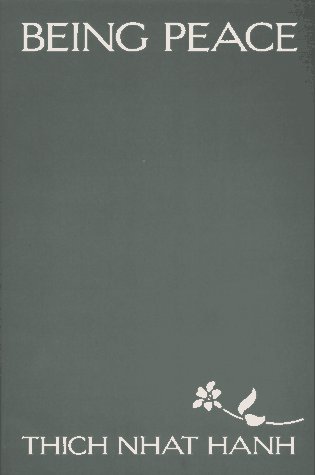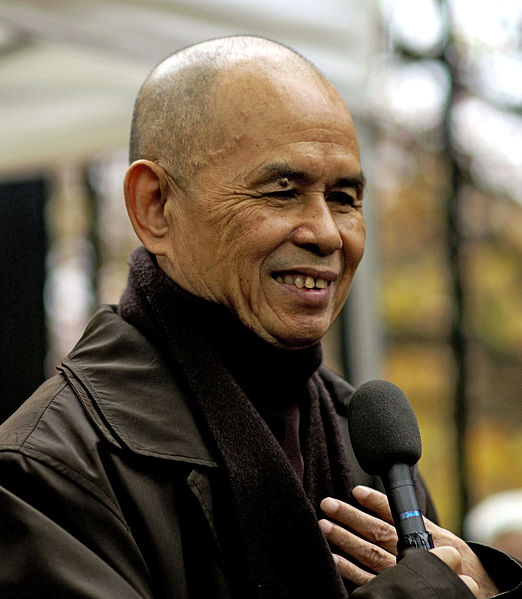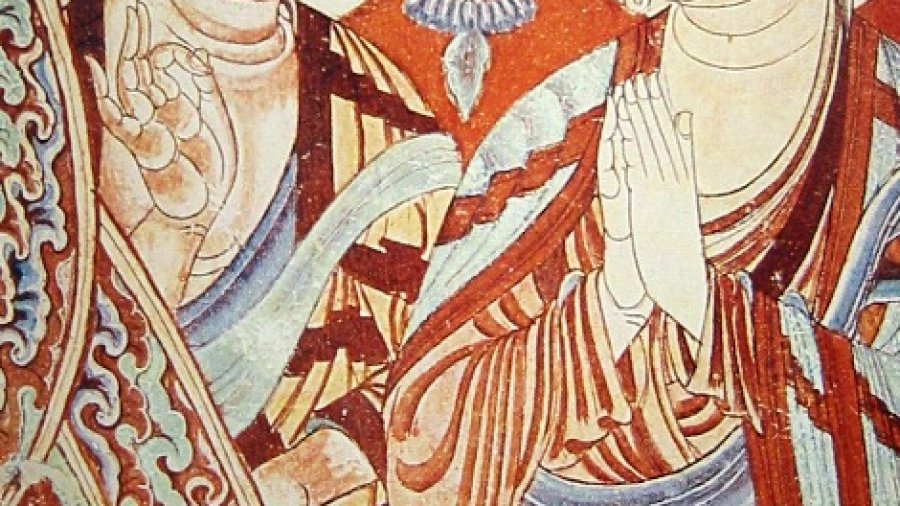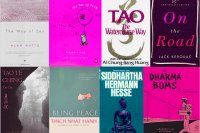Zen Buddhism is pretty chill. Really, I daresay there are few beings as low-key and drama-averse as a Zen monk calmly sampling the fragrance of a rhododendron. Okay, maybe sloths.
One particularly awe-conjuring Zen Buddhist is a fellow by the name of Thích Nhất Hạnh. A Vietnamese monk, teacher, author, poet, and peace activist, Nhất Hạnh has published more than 100 books, traveled and taught around the world, and was nominated by Martin Luther King Jr. for the Nobel Peace Prize in 1967. He’s like a Super Saiyan of Zen.
 A while back, I read Nhất Hạnh’s book, Being Peace, and found it to be all shades of tranquil and nourishing. It’s a splendid introductory text for anyone interested in Buddhism. One particularly serene and worthwhile section of the book elaborates fourteen “mindfulness trainings.” These trainings represent the core substance of the Order of Interbeing, an order of Zen founded by Nhất Hạnh himself for both lay persons and monks.
A while back, I read Nhất Hạnh’s book, Being Peace, and found it to be all shades of tranquil and nourishing. It’s a splendid introductory text for anyone interested in Buddhism. One particularly serene and worthwhile section of the book elaborates fourteen “mindfulness trainings.” These trainings represent the core substance of the Order of Interbeing, an order of Zen founded by Nhất Hạnh himself for both lay persons and monks.
For your consideration, I’ll share these potent and instructive trainings here and briefly paraphrase/comment upon each of them in hopes of illuminating/scrutinizing a few basic aspects of Nhất Hạnh’s teachings and Buddhism as a whole. Question and marinate at your leisure. Ready, set, ponder.

Thích Nhất Hạnh in Paris, 2006. Photo Credit: Wiki Commons
The First Mindfulness Training
Aware of the suffering created by fanaticism and intolerance, we are determined not to be idolatrous about or bound to any doctrine, theory, or ideology, even Buddhist ones. Buddhist teachings are guiding means to help us learn to look deeply and to develop our understanding and compassion. They are not doctrines to fight, kill, or die for.
Paraphrase: Anti-dogma FTW. Don’t ever take any set of ideas too seriously, including these. Inflexible obsessions with particular worldviews lead to suffering, and our goal is to reduce suffering, so we’ll just set rigid mentalities aside. The ideas we study and practice are tools for insight and understanding, not something to tussle over.
My thoughts: Yes, please.
The Second Mindfulness Training
Aware of the suffering created by attachment to views and wrong perceptions, we are determined to avoid being narrow-minded and bound to present views. We shall learn and practice nonattachment from views in order to be open to others’ insights and experiences. We are aware that the knowledge we presently possess is not changeless, absolute truth. Truth is found in life, and we will observe life within and around us in every moment, ready to learn throughout our lives.
Paraphrase: The views that you hold right now? Loosen your grip on them. If we are too attached to particular perceptions and opinions, we’ll fail to adequately open up to the thoughts and lives of others. Our knowledge is not the capital-T Truth. Truth is the flowing river, the warm sun, the llama that just spit in your eye. Our primary goal is to constantly be in touch with the world surrounding us, always ready to learn from it.
My thoughts: “Mindfulness” essentially means being in touch with the sensory experience of the present moment. For Nhất Hạnh, mindfulness is of primary importance in the adventure of existence and the discovery of knowledge. While I often practice mindfulness, I also exalt the joys and delights of thought and imagination and see great value in a vivid inner life.
The Third Mindfulness Training
Aware of the suffering brought about when we impose our views on others, we are committed not to force others, even our children, by any means whatsoever—such as authority, threat, money, propaganda, or indoctrination—to adopt our views. We will respect the right of others to be different and to choose what to believe and how to decide. We will, however, help others renounce fanaticism and narrowness through compassionate dialogue.
Paraphrase: No one—not even our own children—will ever be forced to think like we do because that will lead to suffering, and as we’ve said, we’re not about that life. Create your own world; choose for yourself what to revere and what to incinerate. The only thing we’ll ever do is help an extremist brother, with kind discussion, to calm down a little bit.
My thoughts: Saucy.
The Fourth Mindfulness Training
Aware that looking deeply at the nature of suffering can help us develop compassion and find ways out of suffering, we are determined not to avoid or close our eyes before suffering. We are committed to finding ways, including personal contact, images, and sounds, to be with those who suffer, so we can understand their situation deeply and help them transform their suffering into compassion, peace, and joy.
Paraphrase: Got suffering? Be with it. Suffering, in ourselves and others, is not to be avoided. Rather, it should be countenanced, studied, and felt. Understanding the nature of suffering can allow us to discern an escape hatch; tasting suffering teaches us to transfigure it or let it fall away.
My thoughts: Buddhism, on the whole, is a religion primarily concerned with studying and releasing oneself from suffering, so it isn’t surprising to see this recurring theme in the trainings of the Order of Interbeing. Buddha originally taught that the Noble Eightfold Path would lead to the cessation of suffering.

9th century Chinese fresco portraying a Central Asian monk teaching an East Asian monk. Photo Credit: Public Domain.
The Fifth Mindfulness Training
Aware that true happiness is rooted in peace, solidity, freedom, and compassion, and not in wealth or fame, we are determined not to take as the aim of our life fame, profit, wealth, or sensual pleasure, nor to accumulate wealth while millions are hungry and dying. We are committed to living simply and sharing our time, energy, and material resources with those in need. We will practice mindful consuming, not using alcohol, drugs, or any other products that bring toxins into our own and the collective body and consciousness.
Paraphrase: Real happiness = peacefulness, reliability of character, freedom, and compassion. Wealth and fame don’t bring happiness, and we won’t seek them; nor will we seek sensual pleasure. We aim to live in a basic way and share what we have with those who need help. We will refrain from getting sh**faced.
My thoughts: I applaud these ideals, though I don’t necessarily feel the need to eschew sensual pleasure or intoxication in my own life. These forms of self-denial, or asceticism, are common to many world religions, and I think they are admirable practices depending on one’s aims. My current aims do not require such commitments, and I’ll leave it at that because I could write a lot more on this, but doing so is beyond my scope here. I’ll add that in his novel Siddhartha, Herman Hesse presents a fascinating synthesis of Buddhist ideas and the philosophy of Friedrich Nietzsche. In the novel, the protagonist’s time indulging worldly pleasures—drink, sex, gambling, etc.—ends up proving integral to his attainment of knowledge.
The Sixth Mindfulness Training
Aware that anger blocks communication and creates suffering, we are determined to take care of the energy of anger when it arises and to recognize and transform the seeds of anger that lie deep in our consciousness. When anger comes up, we are determined not to do or say anything, but to practice mindful breathing or mindful walking and acknowledge, embrace, and look deeply into our anger. We will learn to look with the eyes of compassion at those we think are the cause of our anger.
Paraphrase: We’re not mad, bro. If we do get mad, we wish to be mindful of our anger, to see beyond it to the source of the feeling, and to change ourselves at a fundamental level. If we’re angry, we will remain quiet, breathe, take a walk, and embrace our feelings. If someone upsets us, we will seek to understand them.
My thoughts: Anger, hostility, fear, and misunderstanding are the root causes of so many of the world’s issues and tragedies. I think seeking to transform or let go of anger is extraordinarily important. Conversely, I’m human, and sometimes it’s fun to get pissed off at something or someone. I generally try not to make a habit of this, but when I do indulge it, I keep it to myself and try to see it as a game to simply vent my frustration. I also feel that on occasion, fury and outrage are warranted responses to human atrocities and can even be useful, rhetorically, to inspire action.
The Seventh Mindfulness Training
Aware that life is available only in the present moment and that it is possible to live happily in the here and now, we are committed to training ourselves to live deeply each moment of daily life. We will try not to lose ourselves in dispersion or be carried away by regrets about the past, worries about the future, or craving, anger, or jealously in the present. We will practice mindful breathing to come back to what is happening in the present moment. We are determined to learn the art of mindful living by touching the wondrous, refreshing, and healing elements that are inside and around us, and by nourishing seeds of joy, peace, love, and understanding in ourselves, thus facilitating the work of transformation and healing in our consciousness.
Paraphrase: Be here now. We will try to leave the past behind us and not contemplate the future. We will avoid desire, anger, and jealousy. Mindful breathing will anchor us. Mindfulness of what is immediately before us is the key to life’s jazzy nectar. We’re all about that.
My thoughts: Again, I absolutely believe in the benefits of mindfulness, but I am skeptical of ideas like “life is available only in the present moment.” I take this to mean that we are hardly living when we’re caught up in our emotions, lost in daydreams or other reveries, or immersed in thoughts of the past or future. I disagree. I believe all of these states are essential to the human experience and are full of life (this might be a purely semantic disagreement). However, I do generally try to avoid hostility and envy or dwelling on the past or future.
The Eighth Mindfulness Training
Aware that lack of communication always brings separation and suffering, we are committed to training ourselves in the practice of compassionate listening and loving speech. We will learn to listen deeply without judging or reacting and refrain from uttering words that can create discord or cause the community to break. We will make every effort to keep communications open and to reconcile and resolve all conflicts, however small.
Paraphrase: Words are crazy important. We aim to listen without judgment and consider outcomes before speaking. We are not about drama and seek to avoid or resolve it quickly.
My thoughts: Inflammatory and thoughtless language is far too common in the world and a source of tremendous misery. Mindful communication is paramount to alleviating this situation.
The Ninth Mindfulness Training
Aware that words can create suffering or happiness, we are committed to learning to speak truthfully and constructively, using only words that inspire hope and confidence. We are determined not to say untruthful things for the sake of personal interest or to impress people, nor to utter words that might cause division or hatred. We will not spread news that we do not know to be certain nor criticize or condemn things of which we are not sure. We will do our best to speak out about situations of injustice, even when doing so may threaten our safety.
Paraphrase: Again, words are insanely powerful tools. We will use words in a positive way, and we won’t bullsh** anyone or try to cause drama. We will make sure we know what we’re talking about before we speak of something. We will speak out about wrongdoing at all costs.
My thoughts: Groovy.
The Tenth Mindfulness Training
Aware that the essence and aim of a Sangha is the practice of understanding and compassion, we are determined not to use the Buddhist community for personal gain or profit or transform our community into a political instrument. A spiritual community should, however, take a clear stand against oppression and injustice and should strive to change the situation without engaging in partisan conflicts.
Paraphrase: Maintaining a peaceful community is of the utmost necessity. We aren’t out for excess cash and we won’t mess with politics. We will definitively oppose all oppression and injustice without joining imaginary teams and playing human games.
My thoughts: Supreme.

Mahatma Buddha print by Ravi Varma. Photo Credit: Public Domain
The Eleventh Mindfulness Training
Aware that great violence and injustice have been done to our environment and society, we are committed not to live with a vocation that is harmful to humans and nature. We will do our best to select a livelihood that helps realize our ideal of understanding and compassion. Aware of global economic, political, and social realities, we will behave responsibly as consumers and as citizens, not investing in companies that deprive others of their chance to live.
Paraphrase: We will refuse to work for or indirectly support anything which harms our planet or our fellow people. We aim to find a livelihood that allows us to practice our ideals. Through mindful consumption, we will cast our vote against companies with inhumane or unethical practices.
My thoughts: Supple. That last bit, though—quite difficult to know which companies engage in which practices. Something I need to spend more time researching and working on.
The Twelfth Mindfulness Training
Aware that much suffering is caused by war and conflict, we are determined to cultivate nonviolence, understanding, and compassion in our daily lives, to promote peace education, mindful mediation, and reconciliation within families, communities, nations, and in the world. We are determined not to kill and not to let others kill. We will diligently practice deep looking with our Sangha to discover better ways to protect life and prevent war.
Paraphrase: We will be more peaceful than The Dude. We will do everything we can to spread peace and prevent violence.
My thoughts: Kowabunga.
The Thirteenth Mindfulness Training
Aware of the suffering caused by exploitation, social injustice, stealing, and oppression, we are committed to cultivating loving kindness and learning ways to work for the well-being of people, animals, plants, and minerals. We will practice generosity by sharing our time, energy, and material resources with those who are in need. We are determined not to steal and not to possess anything that should belong to others. We will respect the property of others, but will try to prevent others from profiting from human suffering or the suffering of other beings.
Paraphrase: We will always be gentle and kind as we work to protect the well-being of everything on the planet. We will forever be generous and respectful of others’ property, but we aim to stop others from profiting from suffering.
My thoughts: Awesome. This passage sort of touches upon the fact that Thích Nhất Hạnh and many other Buddhists are vegan, refusing to consume or use any animal products. For a long time I’ve admired this ethic, especially in light of the terrible conditions found in large-scale slaughterhouses across the world. Admittedly, I still consume animal products but plan to at least reduce my consumption as well as purchase from organizations with more humane practices in the coming months and years. I may end up ceasing altogether, but it will be difficult, as animal consumption is so much a part of the culture in which I was raised.
The Fourteenth Mindfulness Training
Aware that sexual relations motivated by craving cannot dissipate the feeling of loneliness but will create more suffering, frustration, and isolation, we are determined not to engage in sexual relations without mutual understanding, love, and a long-term commitment. In sexual relations, we must be aware of future suffering that may be caused. We know that to preserve the happiness of ourselves and others, we must respect the rights and commitments of ourselves and others. We will do everything in our power to protect children from sexual abuse and to protect couples and families from being broken by sexual misconduct. We will treat our bodies with respect and preserve our vital energies (sexual, breath, spirit) for the realization of our bodhisattva ideal. We will be fully aware of the responsibility of bringing new lives into the world, and will meditate on the world into which we are bringing new beings.
Paraphrase: We will not get busy unless it truly means something to us. We will always respect the bodies and sexual rights of ourselves and others. We will do everything possible to prevent sexual abuse. We will preserve our vital energies for self-realization. We will recognize that bringing new life into the world is not to be taken lightly.
My thoughts: I admire these ideals. As I said above, though, I think the extent to which one indulges sensual pleasures is always at the individual’s discretion. It’s a matter of values and motivation. I agree that we should always be mindful of what we’re doing with our bodies and how our actions are affecting us. From there, we can determine what is right for us. And of course, all forms of sexual abuse should be staunchly opposed.
Respect
I am not a Buddhist. But, I respect the teachings of various schools of Buddhism and Zen (also Taoism). I see a degree of level-headedness and insight in many Zen teachings that seems lacking in other religions.
I certainly don’t need to embrace all of these ideas to embrace some of them, and indeed, I have tried to integrate many of these precepts into my life. For the better, I think. At this point, I feel I am able to let go, chill out, calm down, soak in, and accept things as never before, all while pushing in small ways toward a more peaceful and open world.
If I am indeed moving in this direction (rather than deluding myself), I believe I owe a few thanks to Buddhism. Its teachings and individuals inspired by its teachings have been as mellow, psychotropical lantern-flames along my way, suggesting a simpler, sorta-halcyon existence within reach. Gracias, Buddhism. Stay majestic.
If this frosted your proverbial cookies, you should follow me on Twitter or subscribe via email/RSS.
P.S. Again, I highly recommend Thích Nhất Hạnh’s Being Peace if you’re interested in peace, Buddhism, or further exploring some of the ideas mentioned here.
About Jordan Bates
Jordan Bates is a Lover of God, healer, mentor of leaders, writer, and music maker. The best way to keep up with his work is to join nearly 7,000 people who read his Substack newsletter.





[…] The 14 Mindfulness Teachings of Thích Nhất Hạnh’s Zen Buddhist Order […]